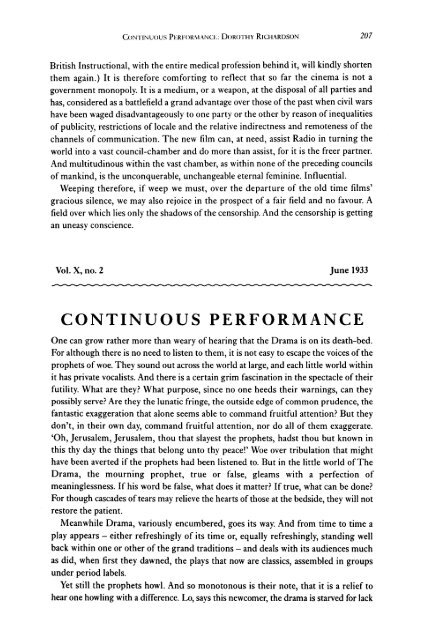close up - Monoskop
close up - Monoskop
close up - Monoskop
Create successful ePaper yourself
Turn your PDF publications into a flip-book with our unique Google optimized e-Paper software.
THK, CONTRIBUTION OF H.D. 99<br />
experience of World War I throughout her life). They serve, nonetheless, to represent<br />
the risks taken by the experimental film-maker, by contrast with the conservative and<br />
conventional 'snipers' in the traditional arts, and to conceptualize film as a 'no-man's<br />
land', which is also (and here we find the concept of film as a 'universal language',<br />
discussed more fully below) 'an everyman's land'.<br />
H.D. also shared Robert Herring's fascination with the cinema as magic. In his 'A<br />
New Cinema, Magic and the Avant Garde', Herring speaks of the 'magical... reality<br />
of light and of movement', of'the fact that light is of all things what we need most and<br />
respond to most', and of the 'magic' of the cinematic apparatus:<br />
There is the screen, and you know the projector is at the back of you. Overhead<br />
is the beam of light which links the two. Look <strong>up</strong>. See it spread out. It is wider<br />
and thinner. Its fingers twitch, they spread in blessing or they convulse in terror.<br />
They tap you lightly or they drag you in. Magic fingers writing on the wall, and<br />
able to become at will ... a sword or a acetylene drill, a plume or waterfall. But<br />
most of all they are an Aaron's rod flowering on the wall opposite, black glass<br />
and crystal flowers ... Only now and again the rod becomes a snake, and whose<br />
films are those we know. ...<br />
You need not be a chamber to be haunted, nor need you own the Roxy to let<br />
loose the spirit of cinema on yourself. You can hire or buy or get on the easy<br />
system, a projector. You then have, on the occasions on which it works, people<br />
walking on your own opposite wall. By moving your fingers before the beam,<br />
you interr<strong>up</strong>t them; by walking before it, your body absorbs them. You hold<br />
them, you can let them go. 20<br />
Herring's models of the destruction of the 'aura' (the distance between spectator and<br />
spectacle) and of the blurring of a body/world division as the spectator inserts him or<br />
herself into the spectacle are characteristic of modernized vision and its altered<br />
perceptions of subject/object relationships. ('The film, by setting the landscape in<br />
motion and keeping us still, allows it to walk through us,' wrote Dorothy<br />
Richardson. 21 ) His article imagines a future for cinema, an 'avant-garde', in which<br />
images would be rendered visible without the mediation of the screen, bodies and<br />
beings becoming solid projections of themselves. There is 'no reason', Herring writes,<br />
'why [man] should not ultimately create himself in motion and speech, moving in the<br />
patterns of his creation'.<br />
Herring's images in this article, his 'hieroglyphs' (rod, snake, flower), strikingly<br />
anticipate those of H.D.'s epic poem Trilogy. 22 More broadly, his vision of humanity<br />
(re)creating itself in a form of virtual reality is echoed in H.D.'s claim, in her article<br />
'Turksib\ that in the great films -Joyless Street, Jeanne Ney, Mother - 'people moved,<br />
acted, suffered, we might also say for the first time, not parodies of people, at best<br />
ghosts, but spirits'. She writes (echoing Eisenstein, discussed below) of Turksib:<br />
'"Thought," one wanted to shout aloud, "is here for the first time adequately<br />
projected," ... These are not images made artificially but thought itself, seen for the<br />
first time, in actual progression. These images are not projected after they have been<br />
manufactured.' 2 ? For H.D, as for Herring, the power of cinema came increasingly to<br />
reside in the absence, or the fantasy of the absence, of technological mediation. It is a

















